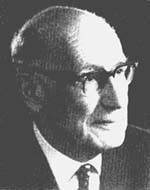
Georg Weinblum began his lifelong work on ship hydrodynamics as a student in St. Petersburg. He completed his studies in Danzig and in 1921 he joined the Technical University of Berlin, where he became a professor, and worked part of the time at the Preussiche Versuchsanstalt fur Wasserbau und Schiffbau. He left in 1938 to become a director of a firm engaged in the development of hydrofoil boats. In 1943 he became a professor of naval architecture at the Technical University of Danzig. After the war he worked for the British Admiralty for a year, and from 1948-1952 he worked at the David Taylor Model Basin in the USA. In 1952 he became director of the Institut fur Schiffbau at the University of Hamburg, where he worked for the rebirth of German research and education in naval architecture. At the same time he was a professor at the Technical University of Hanover.
Georg Weinblum's important scientific contributions covered several aspects of ship hydrodynamics: wave-resistance theory, maneuvering, ship motions, and hydrofoils. Throughout his work he exploited theory to discover what useful information it could give for ship design. This began with an investigation of ships of minimum wave resistance for his doctoral dissertation in 1929 and an early recognition of the importance of analytical representations of ship hulls. In other pioneering research he correctly stressed the importance of considering hydrodynamic, in addition to hydrostatic, forces when evaluating ship motions in a seaway.
For those privileged to have worked with Georg Weinblum, the effect of his enthusiasm, scholarship, and encouragement was profound and lifelong. He inspired a conviction that problems of ship theory are important and solutions within grasp. In addition, he cared not only about the theories but also the people who made them.